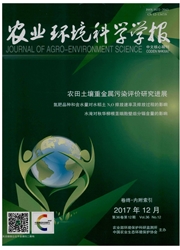

 中文摘要:
中文摘要:
为了进一步了解外生菌根真菌抗重金属胁迫机理,采用室内培养方法。研究了在不同pH环境下,纯培养铆钉菇的生长状况和培养环境的变化。结果表明,pH是影响菌根真菌抗重金属能力的重要因素。对照和Cd50μmol·L^-1处理下,菌根真菌最佳生长pH条件为5.0;Cu50μmol·L^-1处理和Cu25μmol·L^-1+Cd25μmol·L^-1混合处理下,菌根真菌最佳生长pH条件为4.0。菌根真菌能够通过调节自身的培养环境来缓解过高或过低pH的胁迫作用,使培养体系pH向适于真菌生长的方向改变。这种调节作用在重金属处理条件下更加明显。在此基础上。研究了铆钉菇和油松共生条件下,重金属处理前后菌根分泌物总有机碳含量(Total Organic Carbon)的变化。结果表明,在Cu处理后,接种G.viscidus油松分泌物的TOC含量显著高于Cu处理前,说明菌根真菌可以通过分泌有机物质来螯合、固定重金属,影响重金属的生物有效性,从而达到缓解胁迫的目的。
 英文摘要:
英文摘要:
Two experiments were conducted to investigate the resistance of ectomycorrhizal fungi against heavy metals. In the first experiment, the biomass of Gomphidius viscidus under the intimidation of heavy metals and pH was measured as well as the pH variation under its growing conditions. The results indicated that the pH value had great influence on ectomycorrhizal fungi's resistance against heavy metals. When the pH value was 5.0, the biomass of G. viscidus reached maximum in the control and Cd 50 μmol·L^-1 treatment, while the biomass of G. viscidus reached maximum in the treatments of Cu 50μmol·L^-1 and Cu 25 μmol·L^-1+Cd 25 μmol·L^-1 at the pH value of 4.0. The ectomycorrhizal fungi could adjust its own growing condition, which made itself grow better under unsuitable pH conditions. The ability behaved more significantly under treatments with heavy metals. In the second experiment, the total organic carbon (TOC) exudation of ectomycorrhizas (Formation of Pinus tabulaeformis cart. and Gomphidius viscidus) with or without Cu^2+ treatment was measured. The results showed that TOC excreted by ectomycorrhizas after treated with Cu^2+ was significant higher than that before treated, indicating that ectomycorrhizal fungi tolerated the toxicity of heavy metals by excreting more organic substances to stabilize heavy metals and decrease their availability.
 同期刊论文项目
同期刊论文项目
 同项目期刊论文
同项目期刊论文
 期刊信息
期刊信息
